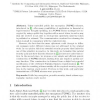Free Online Productivity Tools
i2Speak
i2Symbol
i2OCR
iTex2Img
iWeb2Print
iWeb2Shot
i2Type
iPdf2Split
iPdf2Merge
i2Bopomofo
i2Arabic
i2Style
i2Image
i2PDF
iLatex2Rtf
Sci2ools
ISPEC
2005
Springer
2005
Springer
Token-Controlled Public Key Encryption
Token-controlled public key encryption (TCPKE) schemes, introduced in [1], offer many possibilities of application in financial or legal scenarios. Roughly speaking, in a TCPKE scheme messages are encrypted by using a public key together with a secret token, in such a way that the receiver is not able to decrypt this ciphertext until the token is published or released. The communication overhead for releasing the token is small in comparison with the ciphertext size. However, the fact that the same ciphertext could decrypt to different messages under different tokens was not addressed in the original work. In our opinion this is an essential security property that limits the use of this primitive in practice. In this work, we formalize this natural security goal and show that the schemes in [1] are insecure under this notion. In the second place, we propose a very simple and efficient generic construction of TCPKE schemes, starting from any trapdoor partial oneway function. This co...
Related Content
| Added | 28 Jun 2010 |
| Updated | 28 Jun 2010 |
| Type | Conference |
| Year | 2005 |
| Where | ISPEC |
| Authors | Joonsang Baek, Reihaneh Safavi-Naini, Willy Susilo |
Comments (0)

